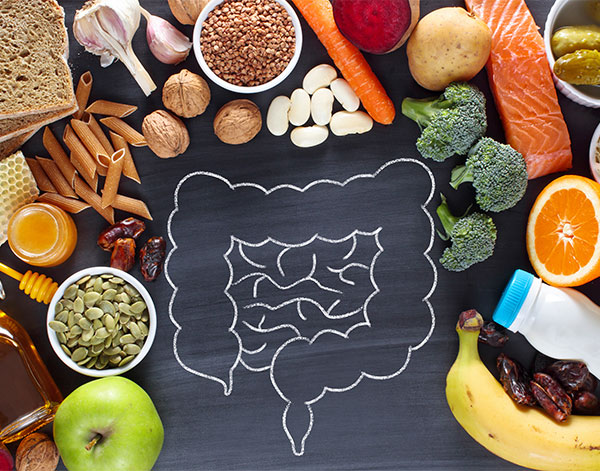Resolve to Improve Your Gut Health in 2025
If you’ve resolved to lose weight or get more cardio in 2025, consider improving your gut health first. Thanks to the “gut-brain axis,” it can take care of the rest.

It may or may not come as news to you that your gut has neurons. This is why you should care: the gut-brain axis.
The gut-brain axis describes the very active communication channel between the neurons in your gastrointestinal tract and your brain, which talk back and forth all day long. What the gut neurons tell the brain is then used by the brain to regulate other parts of the body.
And your gut may be more influential than you realize because the gut-brain axis includes your gut microbiome, a system of trillions of bacteria – good and bad – that perform several critical body functions. A well-balanced gut microbiome protects against disease, maintains a healthy immune system, and metabolizes nutrients for better digestion.
So, if you’ve resolved to improve your weight, heart, or overall health in 2025, it might make sense to first improve your gut health.
How Your Gut Health Influences Overall Health
Let’s start by meeting the members of the gut microbiome. A healthy gut microbiome is populated by a high ratio of beneficial bacteria, fungi, and even viruses. These co-exist with a small percentage of “bad” bacteria. When treated well, the good microbes can keep harmful bacteria in check and maintain good gut health.
But when the gut bacteria are thrown off balance due to diet or another issue – a condition called microbial dysbiosis – your body becomes vulnerable to a range of health conditions. Among them:
Irritable bowel syndrome (IBS) – Medical scientists are unsure of the specific cause of irritable bowel syndrome, but recent research suggests that changes in the gut microbiome can trigger symptoms including abdominal pain, bloating, cramping, diarrhea, and constipation. Evidence also indicates that IBS may result from a dysfunctional interaction in the gut-brain axis, which could make the gut more sensitive to normal sensations such as food moving through the digestive tract.
Inflammatory bowel disease (IBD) – The gut microbiome regulates the immune system, so an imbalance of beneficial bacteria can cause autoimmune conditions – such as IBD – to develop. When this occurs, your immune system attacks your body because it can’t distinguish between healthy and harmful cells. Ongoing research into gut health also suggests microbiome viruses may contribute to IBD. Symptoms include diarrhea, cramping, weight loss, and bloody stools.
C. diff bacterial infection – Clostridium difficile (C. diff) is a type of bacteria that can exist inside some of us without gut health issues. But if the gut microbiome suddenly becomes imbalanced – perhaps from taking antibiotics – the C. diff can multiply and produce toxins that lead to serious infection. People on antibiotics are 10 times more likely to get C. diff.
Digestion-related weight gain – Your gut microbiome plays a pivotal role in weight maintenance because its many different bacteria species produce chemicals that control how food is digested. Some bacteria, for example, produce chemicals that give you a sense of fullness, so you eat less. Others make inflammatory chemicals that can cause weight gain.
An Unbalanced Microbiome Can Punch Beyond Gut Health
A colony imbalance in your gut isn’t contained in the gut; it might lead to these other conditions, too:
Low energy – Your gut produces much of your body’s serotonin, a brain-messaging hormone that supports functions such as mood and sleep. Two 2023 reports by the National Institutes of Health connect gut microbiome disruptions with chronic fatigue syndrome.
Heart disease – A shortage of beneficial gut bacteria may contribute to high blood pressure, strokes, coronary artery disease, and even heart failure, recent studies find.
Diabetes – In 2024, scientists found that specific strains of gut microbes are more common in people with type 2 diabetes. If scientists can alter the microbe, they might be able to reduce the risk.
What You Can Do to Improve Your Gut Health
Your gut microbiome is a living thing, so treat it like it is an extension of yourself – because it is. Take these daily steps:
1. Add color to your plate – Not surprisingly, the foods you feed your gut microbiome immediately affect their diversity and performance. Plant-based foods such as fresh fruits, vegetables, oats, seeds, and legumes carry soluble fiber your gut health thrives on. A diet high in animal protein, including meat, dairy, and eggs, has been linked to IBS. Fried foods are hard on digestion and can aid in harmful bacteria growth. A balanced diet means a balanced microbiome.
2. Fill your glass (or cup) – Good news, coffee lovers. A 2024 study published in Nature Microbiology finds that coffee (caffeinated and decaffeinated) has the greatest positive affect on the gut microbiome’s composition of more than 150 foods and drinks tested. Specifically, coffee stimulates the presence of a beneficial bacterium (L. asaccharolyticus), which contributes to overall health and prevents chronic conditions. Drink plenty of water, too.
3. Sleep – Anything that impedes your sleep compromises your gut health, because of that tight gut-brain axis. Research shows that just two days of sleep deprivation can offset your gut health, and in time can heighten inflammation and stress hormones. A diverse gut microbiome, meanwhile, helps you sleep better because gut bacteria regulate circadian rhythms. If you and your gut do enjoy coffee, switch to decaf in early afternoon.
4. Get chill – There’s a reason we register stressful situations in our guts (butterflies in your stomach, a blow to the stomach, etc. ); it’s the gut-brain axis. A troubled brain will send signals to your gut, just like your gut sends messages to the brain. Therefore, stress, anxiety, and depression can throw off your gut microbiome and your gut health. Stress also is likely to disrupt your sleep, adding more threats to your gut health.
5. Exercise – Research shows that exercise improves gut physiology. Again, the brain is key to this relationship, because cardio workouts generate more oxygen for the brain and bloodstream, which enables good bacteria to flourish. Further, according to UCLA Health, physical activity can heighten antioxidant levels to fight inflammation. Exercise (even low-impact activities) also speeds up the time it takes for food to move through the digestive tract – also good for gut health.
Lastly, just be mindful. Your gut and brain are in conversation right now, working out how to keep your whole body functioning properly. If you sense any of the symptoms listed in this blog, it might be time to call a doctor. Trust your gut-brain axis.
If you think you’re experiencing gut health issues, you can review our patient review of symptoms here. If you’d like to meet a doctor to talk about your gut health, request an appointment for a consultation.

